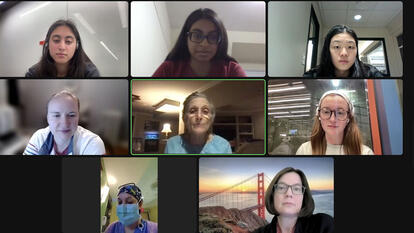Wellesley Women are Ready to Fight for Each Other, according to Globe and Mail

A recent article in Canada’s most-read newspaper, the Globe and Mail, about navigating a post-election world from the vantage point of a women’s college, prominently featured interviews with Wellesley College students and faculty. The article describes Wellesley as a diverse community where its students find their voice, root and fight for each other, are involved in complicated discussions about feminism, and are being prepared to counter systemic bias when they graduate.
At a time when many are contemplating what the 2016 U.S. presidential election means for the country, Globe and Mail writer Simona Chiose came to campus to discuss “what role feminism will play in the lives of women who are now launching their lives,” and how “the discussion over gender in the American election feels most urgent” on college campuses.
Chiose visited campus for a day of interviews with students and faculty, who offered their thoughts on privilege, race, and intersectionality. On campus, she wrote, there are “fevered questions” about how to dialogue with people from across the political spectrum. She warned against assumptions about “privilege” among the student body. At Wellesley, she said, “almost a sixth of students…are the first in their family” to attend college, and 60 percent of students receive financial aid.
According to the students she talked to, Wellesley is a place where young women “find themselves. And it’s a place they learn to fight.” She wrote: “Wellesley is a place where, students will tell you, they feel liberated from the constraints that, as women, they take for granted in the outside world. In one student’s words, the place is ‘an incubator to learn and grow and change…a good bubble.’” She also spoke with alumna, noting Wellesley has “a powerful alumnae network [and] graduates talk about turning to other Wellesley women for advice, not just on careers, but on every stage of life: marriage, children, aging parents. ‘It’s kind of like a football team; you are always rooting for everyone,’ says Shelly Anand [’08], a co-founder of the online magazine for alumn[ae], Wellesley Underground, and a lawyer in Atlanta. ‘You come out with a unique mindset and a unique new voice.’”
Chiose spoke with Jalena Keane-Lee ’17 as well: “Her mission at the moment…is to protect the vulnerable, to #resist, as the Twitter campaign would have it.” Said Keane-Lee, “If you were waiting for a time to get involved with political action, you can’t wait any more.” Lee also discussed her views on feminism: “You can’t have feminism if you don’t fight for racial equality, if you don’t fight for socioeconomic equality.”
Students told Chiose they are prepared to take on a post-Wellesley world. Caroline Bechtel ’17, a cadet in the Reserve Officers’ Training Corps, said, “Especially entering into a mostly male environment, it’s incredibly useful to have a background that acts as if there is no patriarchy. When I am going out and leading a group of all guys, I know that there may be systemic biases in place, but I am ready to navigate those situations. If someone tried to mansplain me, I check it on the spot: ‘Hey, I’m talking here.’ You address it the same way a man would address it.”
Chiose wrote the Wellesley professors teach “the most powerful analytical tool that feminism offers…that of measuring the small, personal experience against the political….” Irene Mata, an associate professor of women’s and gender studies, explained why she thinks the phrase “the personal is political” has remained so powerful: “If you are in a classroom and you are having really complicated discussions about race or really difficult discussions around class privilege or first-generation students, you may not understand that experience. If we are going to challenge how we see the world, we have to challenge our [own] experience in the world.”



